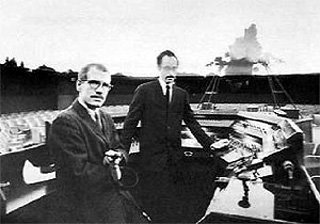
Amon Tobin brought his visually and sonically stunning ISAM show to the Odgen on Wednesday, October 20, 2011. The extended ISAM set had a vaguely narrative thread to the sound and visuals, with some great deep space moments, interstellar craft, and deep solar flare sequences. Just as impressive were the cyberspaces that ISAM explored, which harkened back to intense machinic systems processes. All in all, tremendous blurring of the organic and the machinic, macrocosm and microcosm, and the core elements of fire and water, air and earth, which all came together in alchemical harmonies and dissonances, lightning storms, cybernetic systems spontaneously achieving higher states of (temporary) order before collapsing, and so much more!

The first encore went into some much faster tempo, harder edge material, and sustained this vibe with a whole new set of visual projections, while the final encore brought things down in tempo some with an excellent sequence of tumbling and rebuilding blocks that took full advantage of the amazing 3D visual mapping used for the projections. Great to see that he's selling this show out all around the country.






